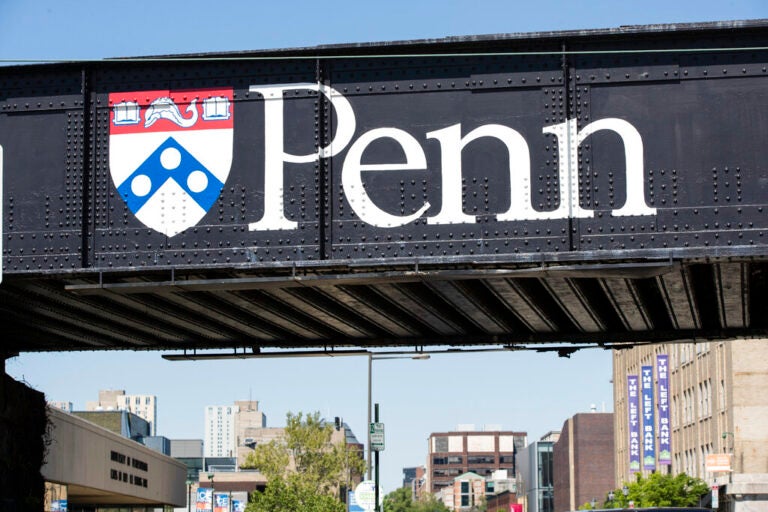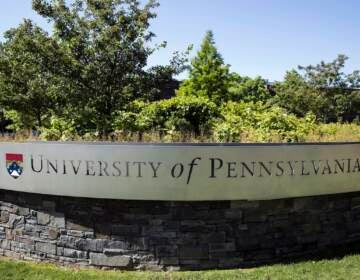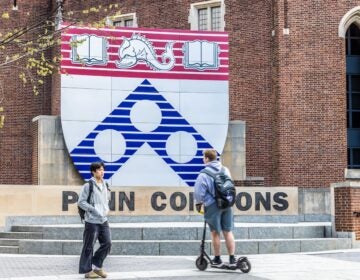Judge approves $284M settlement with plaintiffs for 10 of 17 universities sued for alleged price fixing
The settlement does not include the University of Pennsylvania and six other colleges, which are continuing to defend themselves against the class-action lawsuit.

University of Pennsylvania in Philadelphia Wednesday, May 15, 2019. (AP Photo/Matt Rourke)
From Philly and the Pa. suburbs to South Jersey and Delaware, what would you like WHYY News to cover? Let us know!
A federal judge approved a $284 million settlement by 10 of the 17 universities that were sued for alleged price fixing, although the University of Pennsylvania and six others still face legal action.
The class action lawsuit, filed in U.S. District Court in Illinois in 2022, alleged that the schools were part of the 568 Presidents Group that behaved as a “cartel” conspiring to “fix prices” on financial aid and granting preferential admissions treatment for students of wealthy families and school contributors. This was a violation of federal antitrust laws, according to court papers.
U.S. District Judge Matthew Kennelly approved the settlement amounts July 20 for several institutions. Brown University will pay $19.5 million, the University of Chicago $13 million, Columbia University and Duke University $24 million each, Dartmouth College $33.75 million, Emory University and Yale University $18.5 million each, Northwestern University $43.5 million, Rice University $33.75 million and Vanderbilt University $55 million.
“Antitrust damage is pretty strong medicine,” said John Lopatka, a law professor at Pennsylvania State University and an antitrust scholar. “Each one of these schools is making a calculation about how much is it going to cost to litigate this case. What’s the potential loss they are facing and how much do they have to pay to get out of it.”
As part of the agreement, the universities did not admit to any wrongdoing. Some said they settled to avoid costly litigation.
In addition, Kennelly approved service awards of $20,000 to each of the named plaintiffs: Andre Corzo, Sia Henry, Alexander Leo-Guerra, Michael Maerlender, Brandon Piyevsky, Benjamin Shumate, Brittany Tatiana Weaver and Cameron Williams.
The judge also approved legal fees and expenses for the law firms representing them.
Despite the victory for the plaintiffs, several universities still face legal action, including Penn; California Institute of Technology; Cornell University; Georgetown University; Johns Hopkins University; and the University of Notre Dame.
Some of the schools might believe that they have a strong case, but others are likely to settle, Lopatka said.
The remaining universities contend that the plaintiffs’ claim lack merit and their financial aid and admissions were fair and competitive.
“The court’s decision confirms that these settlements are an excellent result for the class members, who will begin to receive the compensation they deserve. These settlements are a major step in achieving justice for students from working-class and middle-class families. As to the defendants that have not yet stepped up and done the right thing for their students and alumni, we look forward to bringing them to trial,” said lead co-counsels Eric Cramer, Robert Gilbert and Ted Normand in a joint statement.
In court papers, lawyers said the universities, some of the nation’s most prestigious, colluded with each other resulting in better financial aid deals and favorable admissions for students whose parents were wealthy and had made, or were likely to make, financial contributions to the institutions.
The class action is estimated to include as many as 200,000 students who attended the universities over a 20-year period, potentially amounting to billions of dollars.
According to the Financial Aid Antitrust website, the $284 million will provide payments to students who attended the schools that settled and received financial aid, based on need.
The money can be used for some costs related to tuition, fees and housing.

Get daily updates from WHYY News!
WHYY is your source for fact-based, in-depth journalism and information. As a nonprofit organization, we rely on financial support from readers like you. Please give today.





